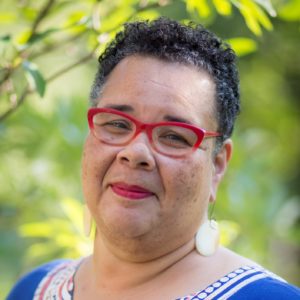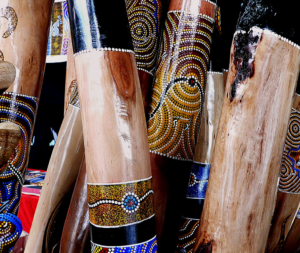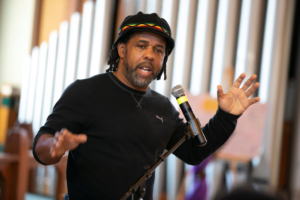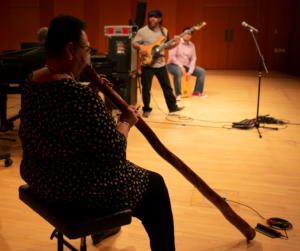
Teacher as Band Leader (Part 2 of 2)
Click Here to Read Part 1

Somewhere along my life’s journey, I learned to play an Australian Aboriginal instrument called the didjeridoo. The didjeridoo is a percussion instrument, said by the Aborigines to be older than the African drum. They use the didjeridoo for meditation, rituals, and rites. A didjeridoo is a long, usually wooden instrument (looks like a rain stick) which is played by blowing into one end. Any didj plays only one note. By manipulating the breath into the didj, the player can shape, prolong, and play-with the one note to create different kinds of sounds. The sounds are often described as basic, primordial, ethereal, and other-worldly. As if the ability to play the didjeridoo is not quirky enough–I can also circular breath. Circular breathing is a technique used by players of wind instruments to produce a continuous tone without interruption. This is accomplished by breathing in through the nose while simultaneously pushing air out though the mouth using air stored in the cheeks. I can circular breath with my dijeridoo. I play my didj for my own meditation. I have, over the years, played two or three times in our seminary chapel services. I have never thought of playing in concert–until March 20, 2019.

On March 20th, five-time Grammy award winning, renowned jazz bass player Victor Wooten came to our campus for a day of teaching and to give an evening concert. Wooten, author of the book The Music Lesson: A Spiritual Search for Growth Through Music, is a master teacher. He infused his lessons with wisdom from his mother and stories of how he started to play the bass at age 3, then, by age 5, he and his four older brothers were on tour as the opening band for Curtis Mayfield. Wooten coupled his life stories with his vast knowledge of music theory and his ability to play the bass in innovative ways. He is a creative genius. At some moment during the day, Victor asked me if I played an instrument. I told him that I play the didjeridoo. He said, “Good–you’ll play with me at the concert tonight.” The moment of emphatic invitation was that spontaneous, that casual, and that unexpected. Reflecting now upon that moment, I suspect I routinely do that to students. I hear that they have an ability, a capacity, a talent and I, without hesitation, incorporate that/them into the band that is our classroom. I am accustomed to being the band leader–I was surprised, on this day, to be a member of the band.
I had confidence that I could do what Victor asked me to do because I knew I could play my instrument. What I did not anticipate was my own nervousness and stage fright.
Near the end of the Wooten concert, I sat in the green room knowing my song was next. I could feel the shallowness of my own breath. I was self-conscious. As I sat, my feet began to cramp. I told myself, “Since I don’t play with my feet, all I have to do is hobble out on stage and sit down, then I can play.” I reached for some water to calm my cramps, but then reasoned that I would need to use the bathroom . . . I was panicking! Inside my head was a voice of confusion and terror. I knew enough to make myself take a few deep breaths and that calmed my fear, if only a bit. As Victor ended a song, I left the green room and went to the wings to wait. The panic rose again–this time my feet were not cramping, but instead I could not focus. I felt like I had lost control of my body. I heard Victor call my name and I stepped out on stage–smiling and terrified.

I retrieved my didj which had been pre-set on the other side of the piano and took my seat in the band. Mark Miller was on piano, Elias Aponte-Ortega was on cajón and Wooten was on bass. The music started and I realized I could not hear–I was deaf! I began to play my didj but all I could hear was air and not a note from my didj. I grew more panicked. I closed my eyes. With eyes closed I could hear myself playing, but I was not playing well. Then I heard Victor say “yeah.” I looked up and Victor was looking at me, smiling and bouncing his head to the rhythm of the song. When I saw Victor, I relaxed–just a little bit. I reminded myself to keep looking at the band leader. Victor, with bass in hand, walked over closer to me and kept his eyes on me and kept smiling at me. As I played, I grew stronger and more focused. He turned and walked back to the middle of the stage. As we had planned, Victor and the other instruments brought their part of the song come to an end and I, on didj, extended my part so the last sound was the didj. I played solo for several moments then ended. The crowd erupted with praise, applause and wonder. I stood, raised my hands above my head, and basked in the surreal moment of it all–still terrified! By all reports, no one knew I was terror stricken. I, from the vantage of the audience, had played brilliantly (thank God and thank Wooten!).
One week later, I recounted my experience of stage fright and terror to my class who had studied Wooten’s book. My story surprised them. I asked if they had had such experiences. The majority of the students yelled “YES!” then some continued–“here, with you, every week!” One student said she had been in terror since having received her admissions letter (she’s graduating this spring). I told them I knew nervousness and butterflies, but this kind of terror was new to me. They looked at me silently as if to say, “Welcome to our world.”

Another student asked if there was a moment that I calmed down. I thought–and remembered the moment I heard Wooten’s voice. His voice brought me back to myself–just a little. Then, when he walked over to me, I was able to restore a bit of my own confidence. I told the students that when I got in touch with the fact that I had a band leader who knew what he was doing, I could believe in myself in that moment.
New experiences make for better, more empathetic teaching. My experience of terror and stage fright, as well as my experience of having had the band leader lead me through the moment has made me more aware of the depth of students’ fears and the power of the band leader, in the midst of that fear, to create a beautiful and innovative song. Instilling confidence in students to move to higher accomplishments and supporting that confidence through the presence of an expectant and knowledgeable teacher is my renewed focus. And, if Wooten ever needs a didjeridoo player in another band–I’m available!
[…] Click Here to Read Part 2 […]